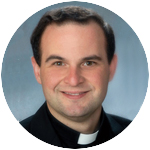
Father Eric J. Banecker
That roaring sound one hears these days emanating from South Philadelphia remind us that yes, it is Red October once again. The Phillies as I write this have embarked on another torrid run through the National League playoffs and have their eyes set on another World Series appearance – and victory. I admit that I have been to several games in these recent playoff runs, and they are the most fun I’ve had at a sports event in quite a while.
Interestingly, in the midst of this, I had a conversation recently at a wedding with a few faithful Catholics who expressed concern or at least ambivalence about our sports culture. The concern expressed, it seems to me, is that people spend an awful lot of time and money worried about athletic competitions. Instead of focusing on games which are sometimes dangerous or played by people who are often lousy role models, one could spend time praying, caring for the poor, and contributing to a more livable society. Indeed, such points merit important consideration.
The world presents so many opportunities for distraction from those most essential and life-giving human vocations. Gambling is a helpful analogy in some ways: most people think an office Super Bowl pool is fine; most everyone agrees that neglecting caring for one’s family to fuel a gambling addition is terrible; and the line between acceptable activity and injustice lies somewhere between those two. The same can be said of just about any human pursuit. Our intention in carrying out an activity or saying something, the question as to whether it edifies others or distracts us from our primary duties – all of these must be considered.
And yet – I do have an apologia of sports. In my experience as an undergrad at Penn, I remember arriving just after the basketball team had started a period of decline after a decade of dominance (admittedly, “dominance” in Ivy League athletics is a relative term). Yet the program was still good enough to draw a strong crowd of students to the Palestra. On a secular campus of 10,000 undergraduates from 50 states and as many countries, one was hard-pressed to find a unifying core to the community. The religious, cultural, and intellectual commitments of the students and faculty was far too diverse for any such strong commitments to unite so many people. Yet basketball and football were two activities where one could find many different people: engineers and English majors, Catholics and Jews and atheists, seniors and freshmen.
Our country is so divided in so many profound ways – in even more complicated ways that what obtains on most college campuses. So, can’t we at least appreciate the fact that our local community has something to rally around? In Philadelphia, we’ve seen police officers shot, entire neighborhoods abandoned to the drug trade, and a cycle of poverty which has claimed generations. Yet right now, at the ballpark, one finds people singing in overalls, high-fiving complete strangers, and standing for three hours cheering for a group of men who (are paid a lot of money to) represent our city.
The deafening cheers at the big home runs gets me thinking about another reality. The Phillies’ ballpark can hold about 45,000 spectators and it’s bursting at the seams. But every single Sunday in the Archdiocese of Philadelphia, about 125,000 people attend the Holy Sacrifice of the Mass. We of course don’t realize this because each of us is in a local community where there may be 50 or 250 or at most 400 at a Mass. But after adding them all up – even in this era when people say “no one goes to church” – we Mass-attending Catholics could fill Citizens Bank Park AND Lincoln Financial Field AND the Wells Fargo Center at the same time.
Do we recognize the spiritual power of this fact? If a baseball team can galvanize a city and give us something – anything – to be united about, can’t the sacrifice of Christ, rendered substantially present in the Holy Eucharist, do this to an infinitely greater degree? What if all those people who could fill multiple stadiums each Sunday truly lived out the Eucharist in their workplaces, families, schools, and neighborhoods? The spiritual force of the Catholic faith lived by men and women of every time and place makes present in mystery the unity which God desires for the entire human race. For what is heaven, if not faithful of all time gathered in love around the Blessed Trinity in an eternal act of worship? Indeed, it’s sort of like a baseball game, just infinitely more sublime. And in heaven, no one loses. Everyone wins, because everyone has accepted the merciful love of Christ, the lamb without blemish who takes away the sins of the world.
I pray that we Catholics will gratefully recognize this profound grace that has been given to us and respond with lives of charity which attract others to join into that communion of love.
For, one day, we will not sing “Take Me Out to the Ballgame” and celebrate for a few hours. Instead, we will sing “Holy, Holy, Holy” and rejoice forever.
***
Father Eric J. Banecker is pastor of St. Francis de Sales Parish in Philadelphia
PREVIOUS: God’s Greatest Gift: The Ability to Choose
NEXT: Praising God Renews Our Faith in His Abiding Love


Share this story